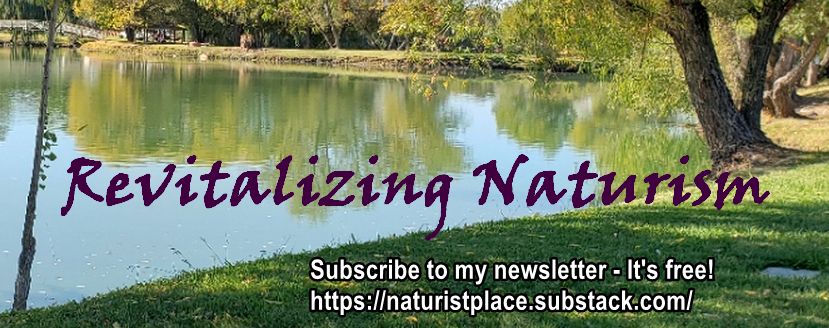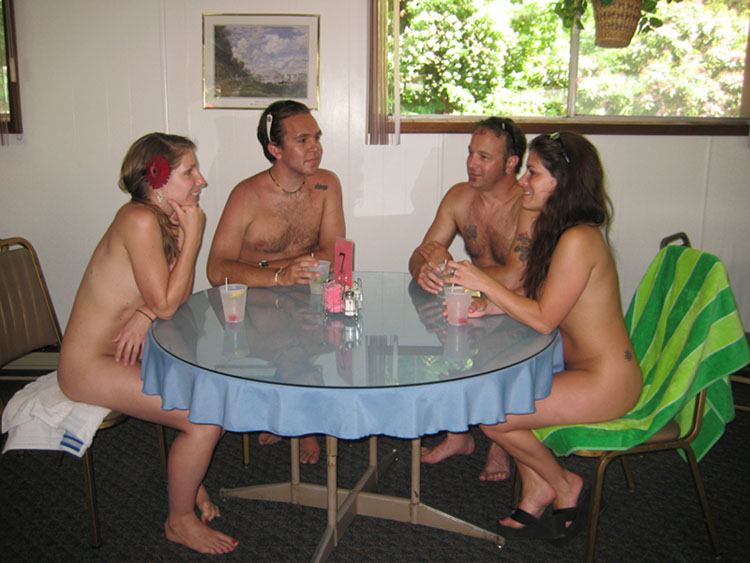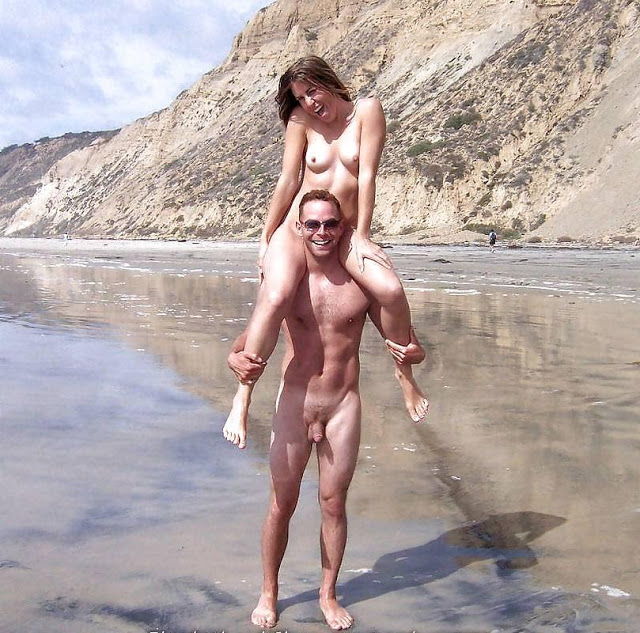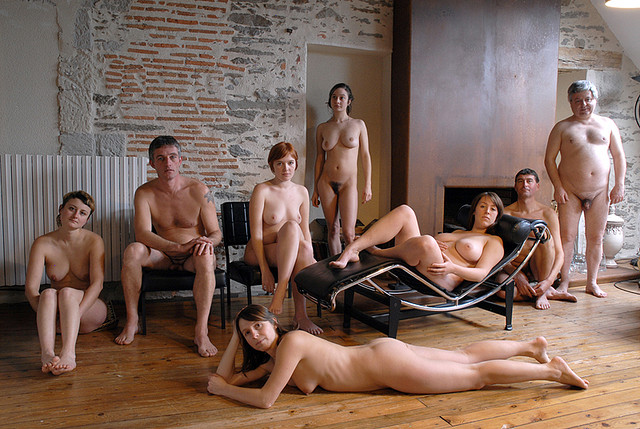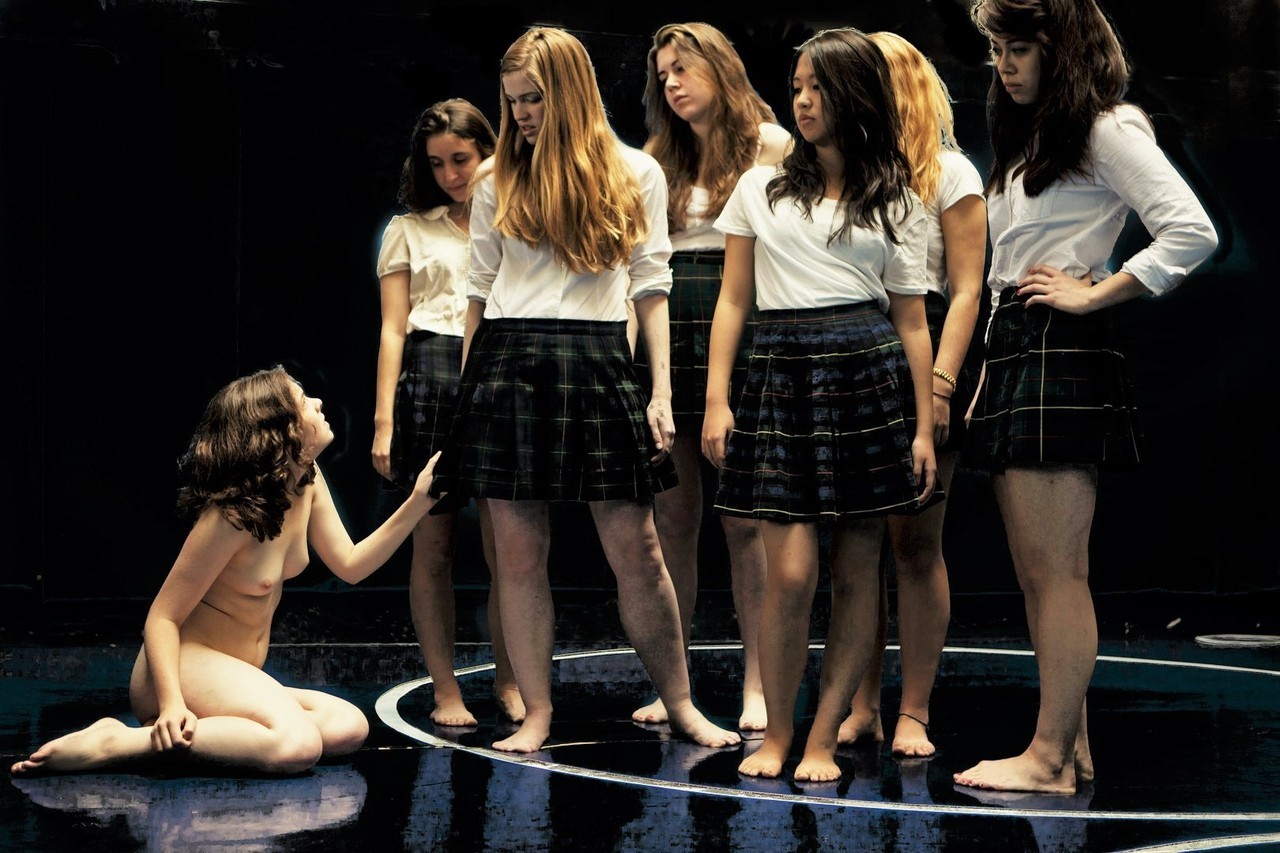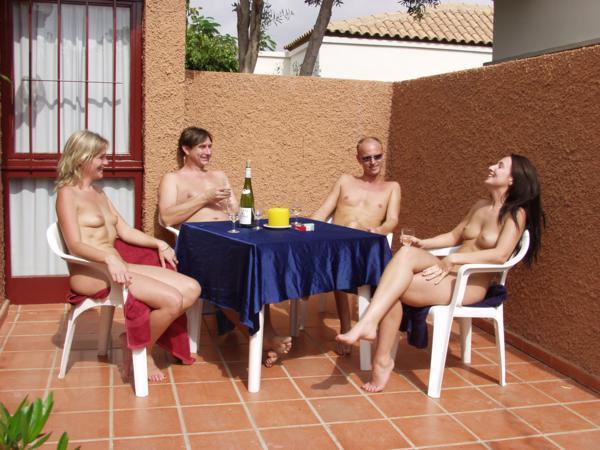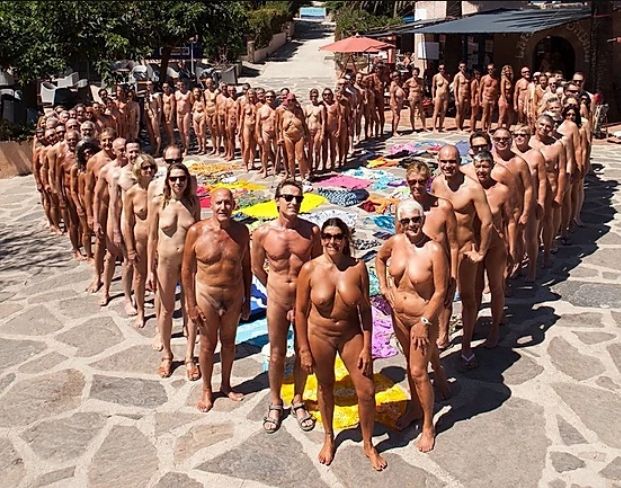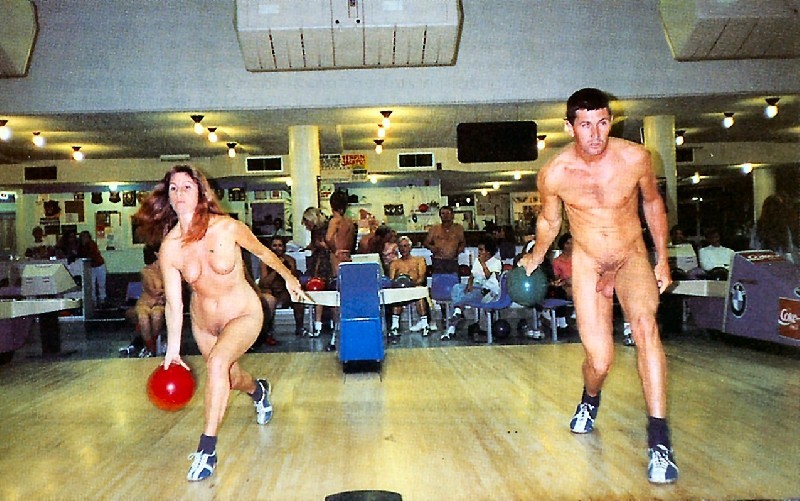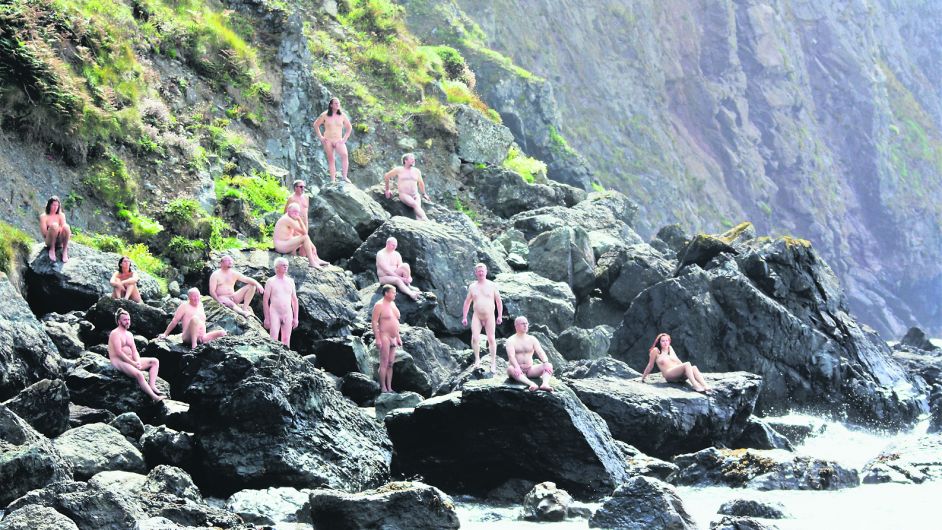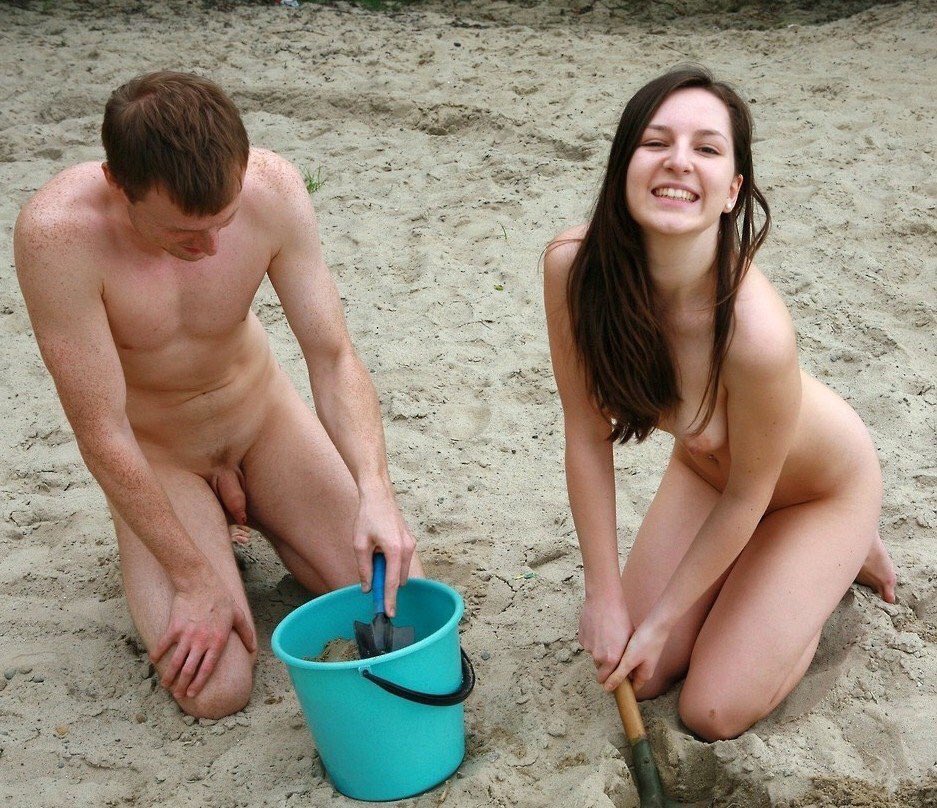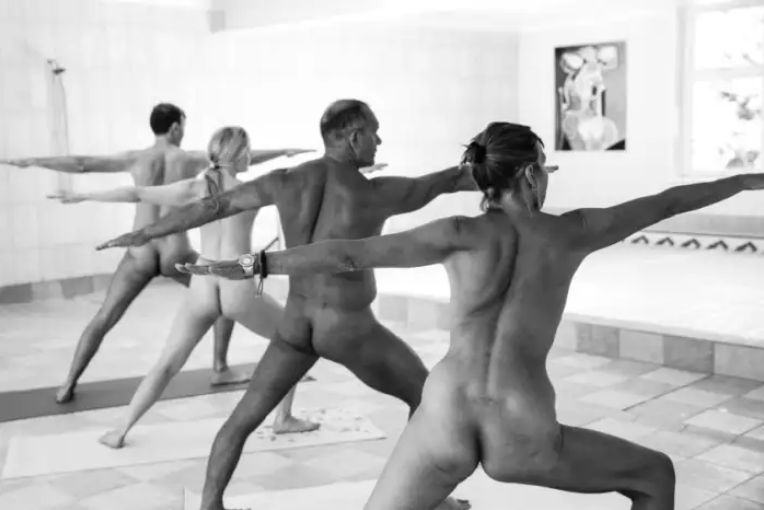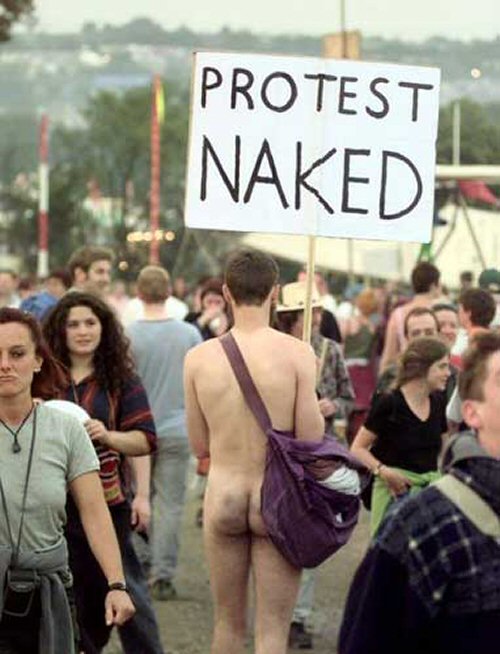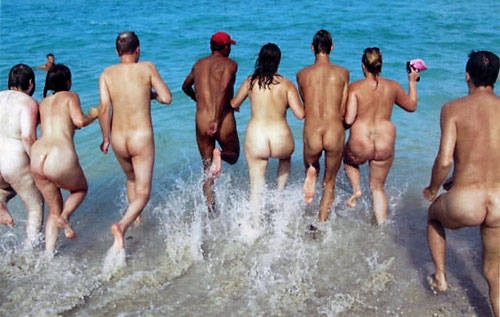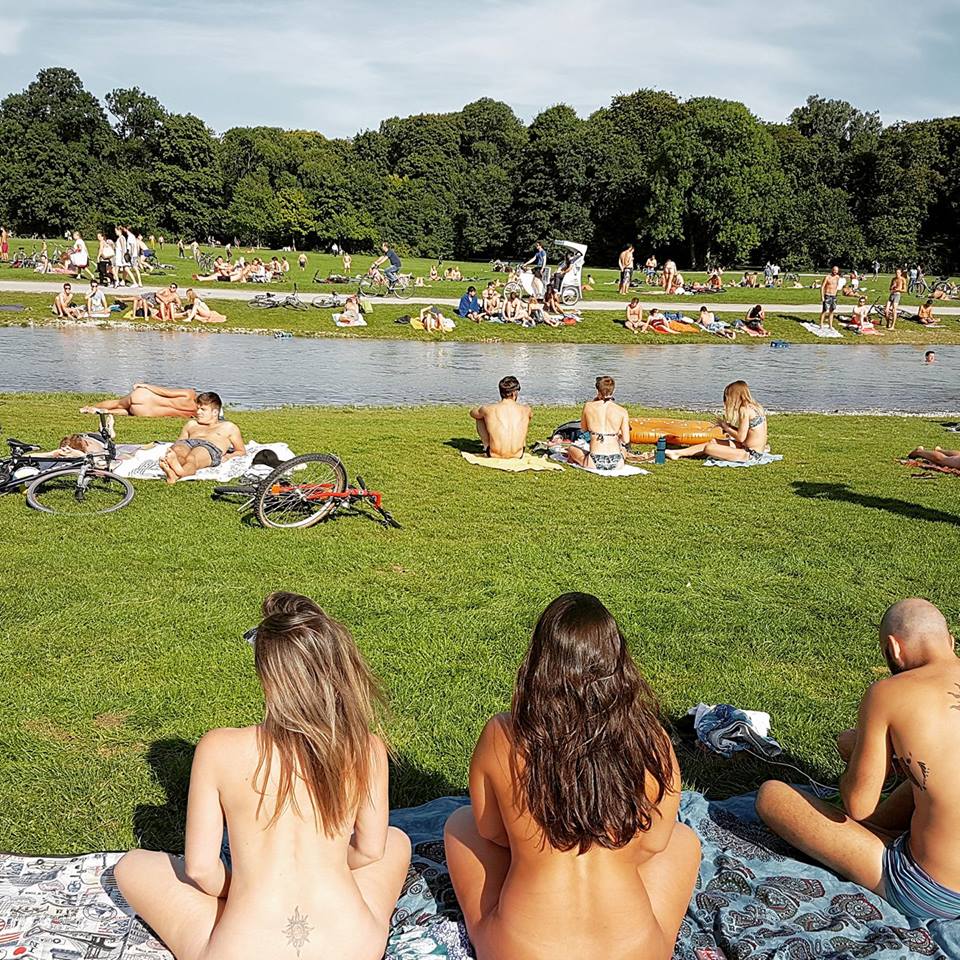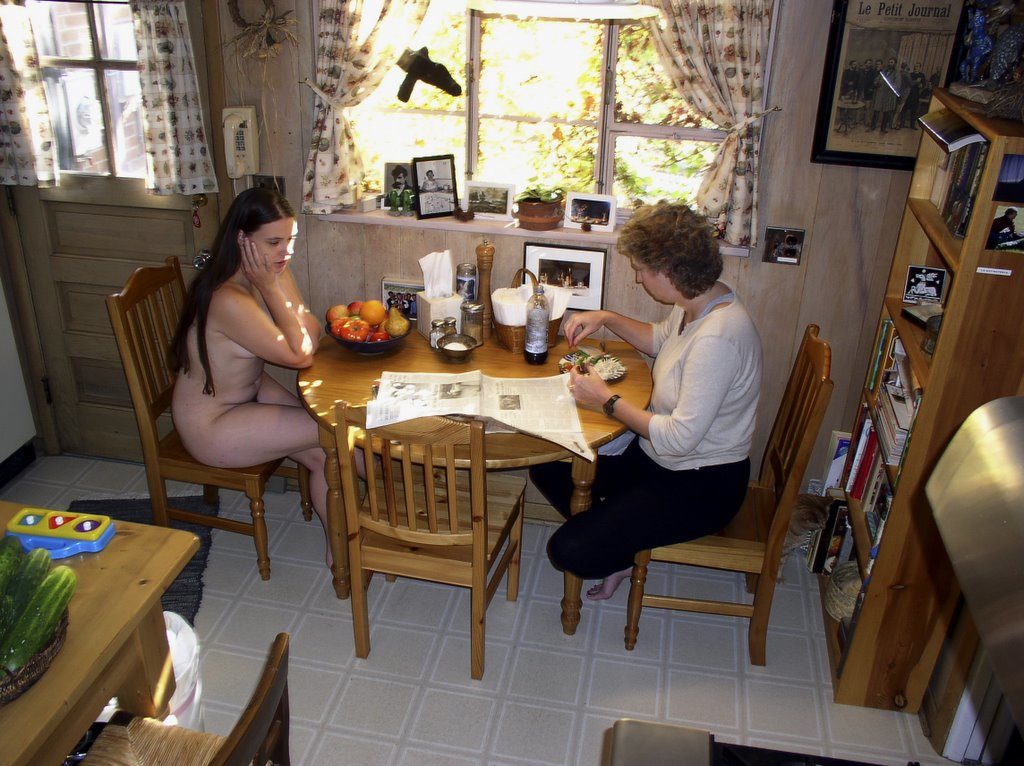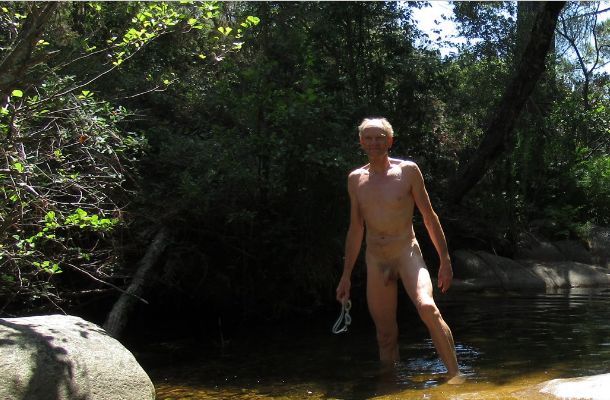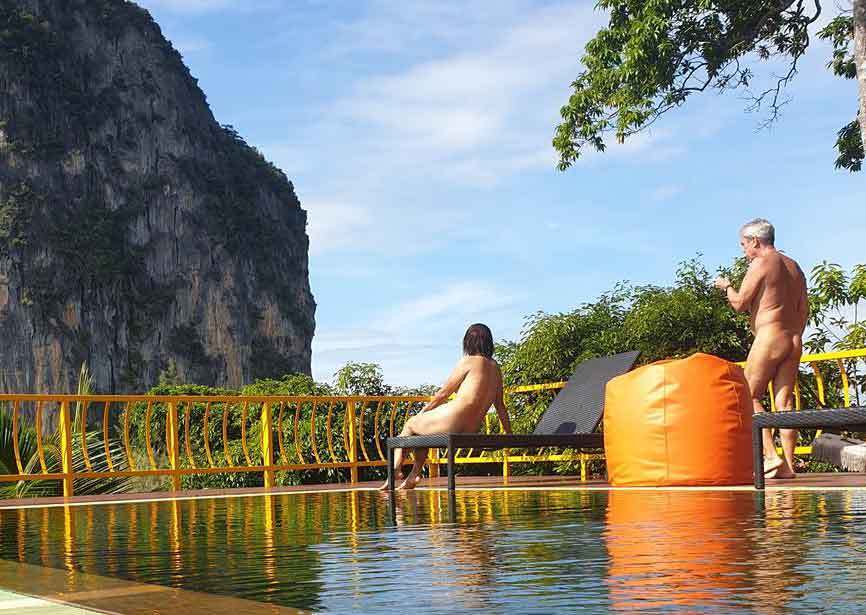- I want the world to know…
What is it that a member of British Naturism – who wrote a brief testimonial – wants the world to know? Why, of course, that he’s very happy to be able to live a significant part of his life naked. In his own words:
“Discovering Naturism is often a turning point in people’s lives. New Naturists tell us all the time how great they feel, how they now can’t imagine life without the opportunity to be happily naked and be part of such a strong, welcoming, non-judgemental community.”
This should be a reminder for all naturists that being able to enjoy a naked lifestyle is a gift of fortunate circumstances – one to be thankful for, since it isn’t automatically available to everyone. For many, it may not be easily within reach, due to various factors, such as opposition from family and/or friends, residence in a place that’s hostile to naturism and nudity, or health problems.
There are probably two main obstacles for most people to overcome in order to realize a naked lifestyle. The first is having the desire and courage to begin at all, in spite of the difficulties that may need to be overcome. The second is a little more subtle. In order to fully enjoy living naked, it’s important to be as open as possible with most of one’s family, friends, and (often) neighbors and workplace associates. Otherwise, there’ll probably be limits to how much nudity can be enjoyed.
Here’s the basic truth: Living naked is healthy – physically and emotionally. It’s nothing to be embarrassed or secretive about. Try to let as many people as possible know that. You may be able to motivate others to try naked living too – which will make that easier for you as well. Sharing this lifestyle with others you know is a reward in itself.
- I had a dream… and it came true
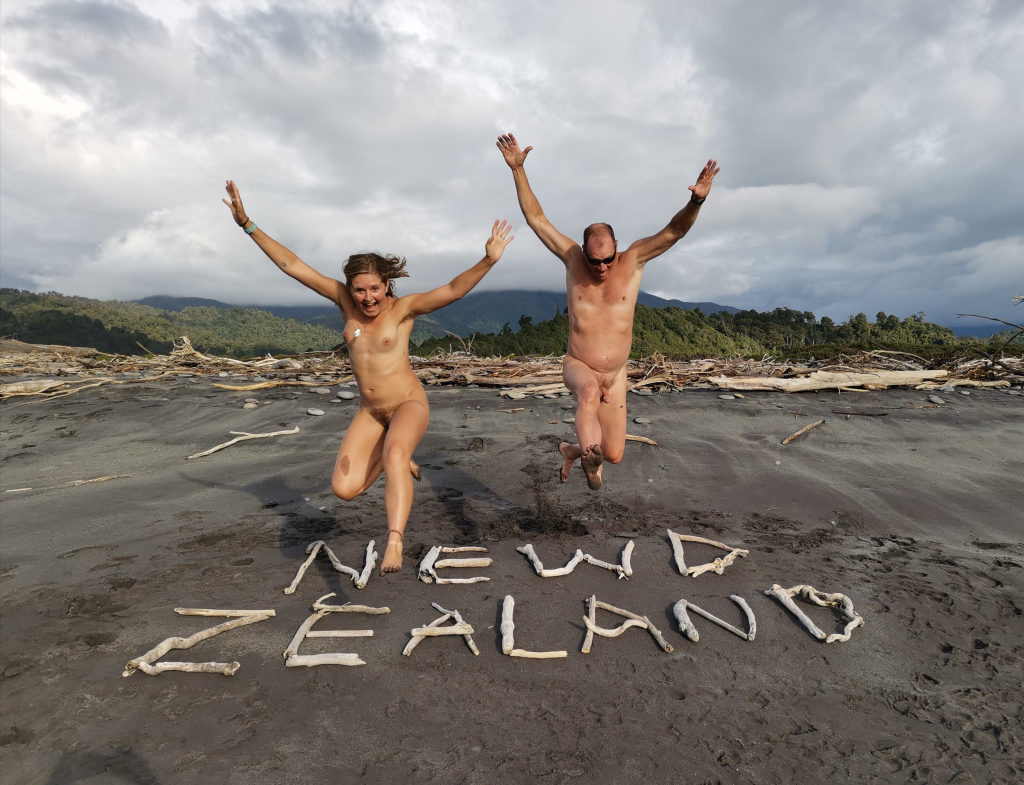
Kate is a relatively new naturist blogger – her first post was last November. In it she relates a story of rare and rather amazing good fortune. That was to have a fortuitous meeting with the author of a New Zealand guide book – which she’d already found to be an exceptionally good guide to many of the spectacular wild natural places of the country.
The result was a fast friendship, which consequently launched her on an unexpected quest to, as she explains, “help put a stop to the body-shaming and judgment we force on each other and set people free to have fun with their fabulous bodies in the fabulous natural world.” Kate’s blog is no ordinary naturist blog that merely doles out some mix of personal opinions and helpful advice on how to enjoy a lifestyle in which nudity plays a central role.
In the post linked here, from April, about five months after the first, Kate explains her dream. In her own words,
“At the beginning of this summer [which, in New Zealand, begins in November] I had a dream of getting multiple people naked in nature together. I had a fantasy (in the most innocent, non-sexual way) of having a group of around a dozen people all get naked and leap in the water together. A fantasy of creating my own tribe of like-minded people. Of building a community of friends who share the same love of nature and freedom as me. I dreamed of being able to help others push their boundaries and experience some liberation.”
That sounds a lot like the ambition of many naturist leaders over the past century. If there were no more to the dream, it would seem a bit hedonistic. But there’s a lot more to it. New Zealand is known for having one of the planet’s most open-minded and intelligent societies. The country is mainly two islands, and much of it is still in a fairly natural state – spectacularly so in many places. There are plenty of excellent beaches.
According to the New Zealand Naturist Federation, “In New Zealand, it is legal to be naked in appropriate public places, such as beaches. It is not the lack of clothes that is the issue but the behaviour that goes with it. Nonetheless, while laws that specifically prohibit nudity and equate it with “indecent exposure” are rare, that should not be taken as an invitation to get naked “anytime, anyplace.””
Kate’s ambition has been to put together a quality guidebook to as many as possible of the best natural places in the country where nudity is not only appropriate but clearly the ideal way to experience nature.
During the past summer, Kate, together with her growing circle of friends, has acquired a wealth of raw material while exploring exactly those places. From that material, she aims to compose a guidebook specifically for adventuresome folks who want to experience nakedly the best that nature has to offer. She concludes:
“We’ve had our summer of fun, frolicking hither and thither, meeting new people and going on great naked adventures. Now we have enough content to fill multiple books! Time to knuckle down and do the office work. This dream is just as scary for me, feels just as fantastical and unattainable. But if I have learnt anything in the last three months, I have learnt that dreams CAN become reality.”
Let’s hope that by the time Kate’s guidebook comes out the worst of the current pandemic is over. Even if some degree of “social distancing” is still necessary, the outdoors is generally the safest place to be – especially anywhere that’s uncrowded enough for nudity to be not at all controversial.
- British Naturism Member Makes Headlines by Rowing the Atlantic
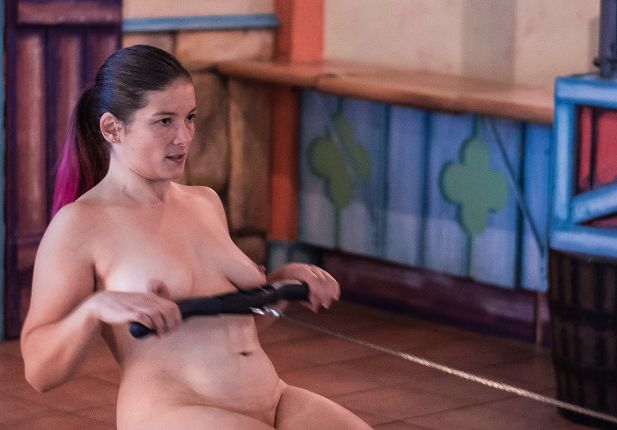
The BN member is Julie Paillin, who was featured in a mainstream news article (link below) as a member of a team that’s “facing the severe endurance challenge of rowing across the Atlantic Ocean. Julie is part of a team of four taking part in the Talisker Whiskey Atlantic Challenge. The team will be the first mixed quad to row the ocean and are doing so to raise money for several charities.” Evidently she won’t be the only one rowing nude, since “Like many of these endurance challenges, the team will be doing much of the rowing nude to reduce friction. As a naturist, this is of course second nature to Julie.”
While the challenge seems daunting enough – even without the nudity aspect – all team members are amateurs, not professional competitors. But at least they will be in a type of boat that’s made such a trip a number of times. According to the news article, Julie “will be joined by a man and two women, who together hope to row a 28ft boat from the Canary Islands to Antigua… The amateur rowers are believed to be the first mixed team to ever complete the massive race.”
News article: Naturist mum rows naked to prepare for 3,000-mile trek across the Atlantic
- Normalizing Nudity

This is a guest post on the Write Nude blog by Fred (whose own blog is here). The main point is very simple, but can’t be repeated often enough:
“The biggest problem in attempting to normalize nudity is the very secrecy nudists must engage in about their nudist activities. It is a self-reinforcing cycle. You’re hiding because you fear getting in “trouble” if you are “outed.” At the very same time, hiding reinforces the notion that what you are doing is nefarious. Others will say, “If you really felt the way you say, you wouldn’t be so secretive about it.””
Fred’s point is absolutely correct. It echoes the ideas in the testimonial discussed above (Item 1). That is: naturists need to share with others what’s so great about naturism. This is also an aspect of Kate’s vision for her guidebook.
Secrecy is the bane of naturism. Many naturists are very secretive about enjoying nudity socially – or even enjoying it occasionally by themselves. It’s the same problem as LGBTQ people faced in the past – and still do in most backward societies (and even with many people in societies that consider themselves less backward).
There are two somewhat distinct adverse effects of the secrecy. First, as Fred points out, being secretive about having a positive attitude towards nudity and naturism causes other people to think there must be something wrong with it. The reasoning is that if the holder of the attitude didn’t agree with the wrongness on some level, the secretiveness would be unnecessary.
Naturists can deal with that reasoning by pointing out that the assumed reason for secretiveness is mistaken. The actual reason is a legitimate fear of adverse effects on naturists due to the unjustified negative attitudes that society has towards nudity. Obviously, but unfortunately, naturists are reluctant to make that argument if they don’t think they can persuade others that the negative attitudes are unjustified. (For naturists who’re willing to try persuading anyone why the attitudes are unjustified I went into some detail in this post.)
A second adverse effect of the secrecy is that society is simply unaware that positive attitudes towards nonsexual nudity and naturism are as prevalent as they actually are. Most people (at least in the U. S.) probably think that nudity and naturism are embraced by fewer than 1% of the population. Why? Simply, because of the secrecy, most people probably aren’t aware of any naturists among their acquaintances.
Estimating fairly accurately the percentage of a given population having positive attitudes towards nudity and naturism is difficult. Some surveys suggest percentages much higher than 1%. In some European countries, like France and Germany, perhaps 20% or more of the population may occasionally, if not more often, strip off at clothing-optional beaches, get naked at public spas, visit naturist campgrounds or resorts, or simply enjoy nudity at home. The percentages in the U. S. and similar countries could be closer to 10%. But – because of the secrecy – who really knows?
- World Naked Gardening Day 2020
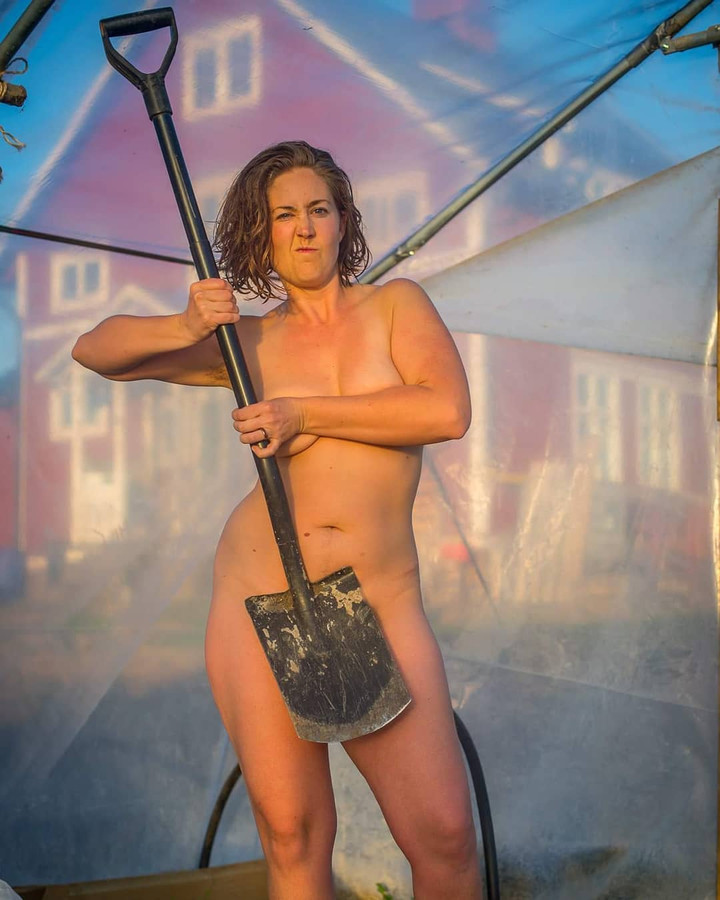
WNGD 2020 (in the northern hemisphere) is already past – but that doesn’t mean being naked to do your gardening (if it’s something you enjoy) is no longer an option. If the location of your garden gives you enough privacy, you might as well always be naked while working there (weather permitting). Were you gardening naked on May 2 without objection from your neighbors? If so you can probably continue that way – without really needing the excuse that May 2 was the “official” day for it. (Unless you’re the sort of person who can dress in an unconventional way – just because you feel like it – only on Halloween.)
Surprisingly, the idea for World Naked Gardening Day was actually conceived by a U. S. naturist – Mark Storey – and the first occurred in 2005. (Reference.) I actually wrote about it back then.
The idea did spread worldwide – and it’s even observed in the southern hemisphere – although on a different day down there. (See this post.)
For another take on WNGD, see this article by naturist Linda Weber – who also wrote a good article on her positive experiences at Haulover Beach, discussed here.
- Nude Online Meetups: The Next Step in Social Naturism?
Here’s another take on how to enjoy social nudity during a pandemic – or anytime naked socializing is impractical – by interacting with other naturists using video conferencing with tools like Zoom. After some downbeat observations on earlier forms of online naturism, Nick & Lins get around to their account of their online meeting with Dan Carlson et al – which has already been covered here from Dan’s side. More on the general subject is here.
Although Nick & Lins were skeptical at first, their interaction with the Carlsons seems to have changed their mind:
“What we half expected to be an awkward fifteen minutes or so video chat with a guy who we hadn’t even met in person, turned out to be a fun evening filled with wine and great conversations. We got to meet Dan’s wife, their dog and Addie, a regular at the Carlsons and an occasional guest blogger on The Meandering Naturist blog.”
What is it that makes video interaction much better than text-only conversations on naturist forums or social networking sites? Many things, such as:
- Physical appearance of the participants. Not so much their physical attributes, but the way they present themselves through facial expressions, mannerisms, gestures, and other body language.
- The tone of voice and speaking style of the participants.
- The degree that participants respond appropriately with laughter, concern, or empathy to each others’ remarks.
- How readily, thoughtfully, and coherently they contribute to the conversation.
- How politely and respectfully participants interact with each other and avoid dominating the conversation.
- Various other factors that reveal the unique personalities of each participant.

